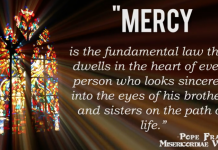
by Page McKean Zyromski
Many people live “cafeteria style” lives, self-service only. Catholics try to live life like Jesus, who “did not come to be served but to serve” (Matthew 20:28). The Year of Faith is a perfect time to explore this calling.
Our Own Backyard
We don’t have to be missionaries in a faraway land to serve Christ and others. Charity begins at home (and it often is harder to be charitable with our own families than it is strangers). “If everyone swept their own front porch,” the old saying goes, “soon the whole street would be clean.”
Cultivating the habit of “noticing” is how to begin. Do we notice when someone at dinner is eyeing the Parmesan? Do we notice at reunions that no one wants to talk to grouchy Uncle George? Do we notice that our elderly neighbor struggles to lug the trash to the curb?
We notice what our “brother” or “sister” needs, and then we match it with our ability.
It’s the Lord Whom We Serve
Timeliness and cheerfulness are important. No one is going to give us merit badges for “service.” Rather, it’s the Lord whom we serve. Once when Blessed Mother Teresa of Calcutta was washing a filthy person from the gutter, someone told her “I wouldn’t do that for a million dollars!” Mother Teresa replied, “Neither would I!” She was doing it for the Lord in his “distressing disguise.”
When we see that something needs doing and are able to help, we act promptly. The words “I’ll get around to it” or “I’ll do it later” often signal our basic unwillingness to help. But these phrases should ring a bell in our minds: We have another thing to “notice”! An old nursery rhyme goes, “A man of words and not deeds is like a garden full of weeds.”
If we view the action as a chore or martyrdom, it’s not being done in the spirit of service.
A Balancing Act
On the other hand, students need to be taught that self-care is equally important. We can’t exhaust ourselves until we have nothing left to give. Loving our neighbor as we love ourselves (see Matthew 19:19) means that we love ourselves enough to balance our own legitimate needs—for health, recreation, friendship—with the good we are trying to do for others. If we don’t take care of ourselves, others will have to “serve” us! The time will come for each of us when we will be in need; after all, we are all human. In those difficulties, we will learn how hard it is to be on the receiving end when we’ve lived a life of independence.
Stepping Stones of Service
Noticing the needs of others, forming habits of helping in small ways, being dependable, and being careful to balance our lives: These are the stepping stones of service. They don’t sound earth-shaking but, as Jesus said, “The person who is trustworthy in very small matters is also trustworthy in great ones” (Luke 16:10). How can we reinforce these ideas?
We can teach the Corporal and Spiritual Works of Mercy (see Catechism of the Catholic Church, n. 2447). Give local examples.
We can discuss what it means to “pay it forward” and what “random acts of kindness” are (tossing a newspaper onto a neighbor’s porch, picking up litter).
We can challenge students to form the habit of saying “While I’m up…” at home. “Do you need anything while I’m up? Can I get you anything from the kitchen while I’m getting myself a drink of water?” (Discuss students’ experiences with this.)
With the class, draft a list of small services they can do for their parish (tidying the pews after Mass, holding the church door open before and after Mass), for their neighbors (helping to rake leaves or shovel snow, occupying small children while adults chat or do chores), and for their families (clearing the table without being asked, bringing in groceries).
Stress dependability, perseverance, and a cheerful heart.
Page McKean Zyromski, a catechist for 45 years, has been a contributor to CATECHIST since 1983. She lives in Painesville, OH. You may contact her at pagezyromski.com.
Copyright 2013, Bayard, Inc. All rights reserved. This article is protected by United States copyright and other intellectual property laws and may not be reproduced, rewritten, distributed, redisseminated, transmitted, displayed, published or broadcast, directly or indirectly, in any medium without the prior written permission of Bayard, Inc.
This article was written by the Catechist Staff and appeared in Catechist magazine, June 2013.
Image Credit: MIA Studio/Shutter Stock 557176453




